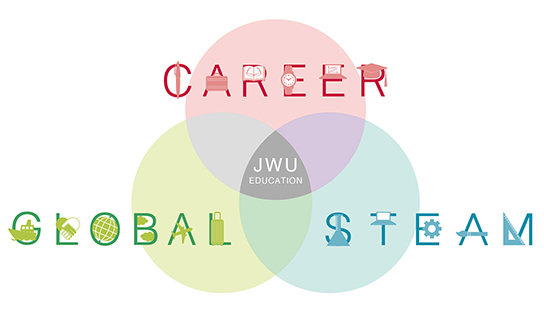- Diploma Policy (Master's Program)
- Curriculum Policy (Master's Program)
- Admission Policy (Master's Program)
- Diploma Policy (Doctoral Program)
- Curriculum Policy (Doctoral Program)
- Admission Policy (Doctoral Program)
Diploma Policy (Master's Program)
Knowledge and understanding
- Students will have the latest knowledge in their respective fields of specialization and profound learning to properly understand the significance of cutting-edge research.
Thinking and judgment
- Students will be able to evaluate their own and others' research objectively and logically based on their own profound learning, and to correctly judge their own research direction.
Interest, volition, attitude
- Students will have an attitude of paying close attention to trivial phenomena, etc., which are usually overlooked, being always aware of problems, and actively engaging in research.
Skills and expressions
- Students acquire the experimental techniques necessary to carry out research, are proficient in obtaining information in their field of specialization, and have the ability to effectively present their findings to academic societies and society.
Curriculum Policy (Master's Program)
Knowledge and understanding
- Lectures are offered which enables students to acquire advanced knowledge in each specialized field of "Materials," "Cellular and Molecular Function," and "Physiological and Molecular Function.”
Thinking and judgment
- Seminars are offered which enable students to review research progress and to verify it objectively and logically through the presentations and discussions of their own research.
Interest, volition, attitude
- The “Research for Master’s Degree” is offered as a subject for improving comprehensive and practical research skills, conducting discussions and debates with the supervisors and providing experimental guidance. In addition, students are required to write a master's thesis that meets the standards set forth in the JWU Degree Regulations.
Skills and expressions
- The “Seminar of Material and Biological Sciences” is offered to improve students' presentation skills by allowing them to present and discuss their own research.
Admission Policy (Master's Program)
Knowledge and understanding
- Students who have a systematic knowledge of chemistry, biology, and the fundamentals of their field of specialization.
- Students who have basic English language skills.
Thinking and judgment
- Students who have acquired objective perspectives as well as evaluation and judgment skills based on logical thinking.
Interest, volition, attitude
- Students who have a strong interest in natural science and a volition to engage in more advanced research in their respective fields of specialization, with the aim of becoming independent researchers or engineers who can make the most of their expertise in the future.
Skills and expressions
- Students who have basic research skills in their own fields of expertise, as well as a certain level of experience and ability in obtaining and presenting information.
Diploma Policy (Doctoral Program)
Knowledge and understanding
- Students will have latest knowledge in their respective fields of specialization and profound learning to properly understand and evaluate the significance of cutting-edge research.
Thinking and judgment
- Students will be able to evaluate their own and others' research objectively and logically based on their own profound learning, and to correctly judge their own research direction.
Interest, volition, attitude
- With a broad interest in issues outside their own field of specialization, students will have an attitude of constantly observing matters with a problem awareness and actively engaging in research.
Skills and expressions
- Students will acquire the experimental techniques necessary to carry out research, be proficient in obtaining information in their field of specialization, and have the sufficient ability to effectively present their findings to academic societies and society.
Curriculum Policy (Doctoral Program)
Knowledge and understanding
- Students are required to independently acquire advanced knowledge which is necessary for specialized fields through discussions and debates with each supervisor in the "Research for Doctoral Degree.”
Thinking and judgment
- Seminars are offered to improve students' presentation skills by allowing them to review the research progress and to verify it objectively and logically through the presentations and discussions of their own research.
Interest, volition, attitude
- The “Research for Doctoral Degree” is offered as a subject for improving comprehensive and practical research skills, conducting discussions and debates with the supervisors and providing experimental guidance. In addition, students are required to write a doctoral dissertation that meets the standards set forth in the JWU Degree Regulations.
Skills and expressions
- The “Seminar of Material and Biological Sciences” is offered to further improve students' presentation skills by allowing them to present and discuss their own research.
Admission Policy (Doctoral Program)
Knowledge and understanding
- Students who have systematically acquired specialized knowledge in their respective fields.
- Students who have English language skills in their field of expertise necessary for access to advanced knowledge.
Thinking and judgment
- Students who have acquired objective perspectives as well as evaluation and judgment skills based on logical thinking.
Interest, volition, attitude
- Students who have a strong interest in natural science and a volition to engage in more advanced research in their respective fields of specialization, with the aim of becoming independent researchers in the future.
Skills and expressions
- Students who have research skills necessary for conducting research in their own fields of expertise, as well as an appropriate level of experience and ability in obtaining and presenting information.

